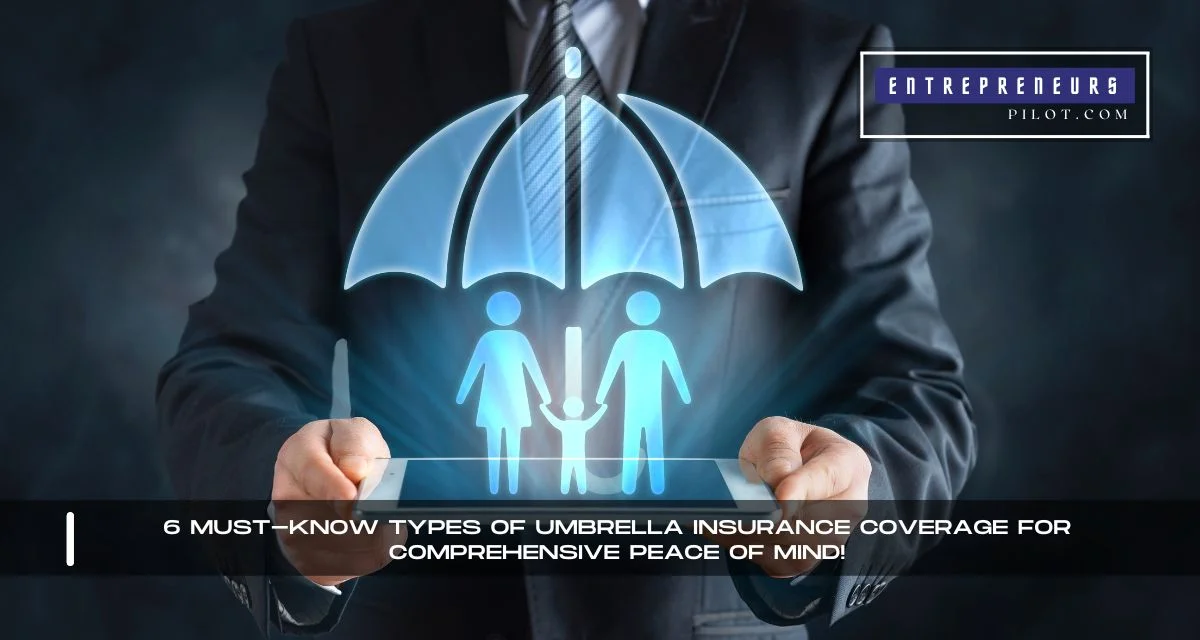Introduction
Navigating the world of insurance can often feel like trying to find your way through a maze in the dark. But there’s one beacon of light that can offer comprehensive protection beyond your standard policies: umbrella insurance. With the Types Of Umbrella Insurance Coverage, you can extend your safety net to cover the unforeseen, ensuring that you’re shielded against the storms of life’s legal battles and liability claims. Let’s embark on a journey to uncover the six must-know types of umbrella insurance coverage that promise comprehensive peace of mind, safeguarding your assets, and securing your future in ways you might not have imagined possible.
Table of Contents
Personal Liability Coverage
At the heart of umbrella insurance is personal liability coverage, which steps in where your homeowners or auto insurance limits end. Imagine being sued for damages or injuries you’re responsible for that exceed your primary insurance limits. This coverage is your financial fortress, protecting your assets from being eroded by legal fees and judgments. It’s not just insurance; it’s an assurance that your financial health remains intact, even when faced with significant legal challenges.
Bodily Injury Liability
Bodily injury liability is crucial for anyone who could face legal action due to accidents that cause physical harm to others. Whether it’s a guest slipping on your driveway or a serious car accident where you’re at fault, this coverage extends your protection, covering medical bills, legal fees, and even lost wages. It’s the peace of mind that comes from knowing an accident won’t lead to financial ruin, allowing you to live your life freely, without the constant worry of “what if?”
- For Expert Financial Insights And Guidance, You Can Visit Our Sister Site – ArabsGeek.com Now!
- Curiosity Piqued? Dive Into the Most Captivating Financial Content by Visiting Our Homepage!
- Unlock Exclusive Business Opportunities! 🚀 Connect with Us Now at our Email: [email protected]!
Property Damage Liability
Then there’s property damage liability, which comes into play if you’re responsible for damage to another person’s property. From a mishap that destroys a neighbor’s fence to an auto accident damaging someone else’s car, umbrella insurance can cover the extensive costs of repairs or replacement, beyond what your standard policy covers. This coverage ensures that an accident doesn’t have to deplete your savings, keeping your financial future secure.
Landlord Liability
For those who dabble in real estate and rent out property, landlord liability under umbrella insurance is a godsend. It protects against liabilities that could arise from tenant-related incidents, offering an extra layer of protection beyond traditional landlord insurance. Whether it’s a lawsuit for an injury on your rental property or a claim for accidental damage, this coverage stands as a bulwark, safeguarding your investment and income stream from potential legal entanglements.
Libel, Slander, and Defamation of Character
In our digital age, a word out of place can result in a lawsuit for libel, slander, or defamation of character. Umbrella insurance offers protection against these personal injury claims, covering legal defense costs and potential damages. Whether you’re caught in a misunderstanding or a momentary lapse in judgment, this coverage ensures that your freedom of speech doesn’t cost you your life’s savings.
Legal Defense Costs
Umbrella insurance also shines by covering legal defense costs, even if the lawsuit against you is groundless or fraudulent. This aspect is crucial, as legal fees can accumulate rapidly, draining your resources before you even get to court. With this coverage, you can afford the best defense without worrying about the financial impact, giving you a fighting chance to protect your name and assets.
Conclusion | Types Of Umbrella Insurance Coverage
Umbrella insurance coverage is not just an add-on; it’s a necessity for anyone looking to secure comprehensive protection in today’s litigious society. By extending your coverage beyond the limits of standard policies, it provides a safety net that catches you when life tries to pull the rug out from under you. Whether you’re faced with a lawsuit, an accident, or a claim against your property or character, the six must-know types of umbrella insurance coverage offer the comprehensive peace of mind you need to navigate life’s uncertainties with confidence. Remember, it’s not about expecting the worst; it’s about being prepared for anything.
Frequently Asked Questions
01. Who should consider getting umbrella insurance?
Anyone with assets that exceed the liability limits of their standard auto, homeowners, or other policies should consider umbrella insurance. It’s also advisable for those who engage in activities that increase their risk of lawsuits, such as landlords, pet owners, or individuals with significant public exposure.
02. How much umbrella insurance coverage do I need?
The amount of coverage depends on your personal risk factors and the value of your assets. A good rule of thumb is to have enough coverage to at least match the total value of your assets, ensuring that you’re fully protected.
03. Is umbrella insurance expensive?
Compared to the amount of coverage it provides, umbrella insurance is relatively affordable. Premiums vary based on the coverage amount and your risk factors, but it generally offers a high value for the cost.
04. Can umbrella insurance replace my existing policies?
No, umbrella insurance is meant to supplement, not replace, your existing liability insurance policies. It kicks in after your primary insurance limits are reached, providing an extra layer of protection.
05. Does umbrella insurance cover intentional acts or criminal activities?
No, like most insurance policies, umbrella insurance does not cover damages or liabilities arising from intentional criminal acts or activities you undertake with the expectation of causing harm.











